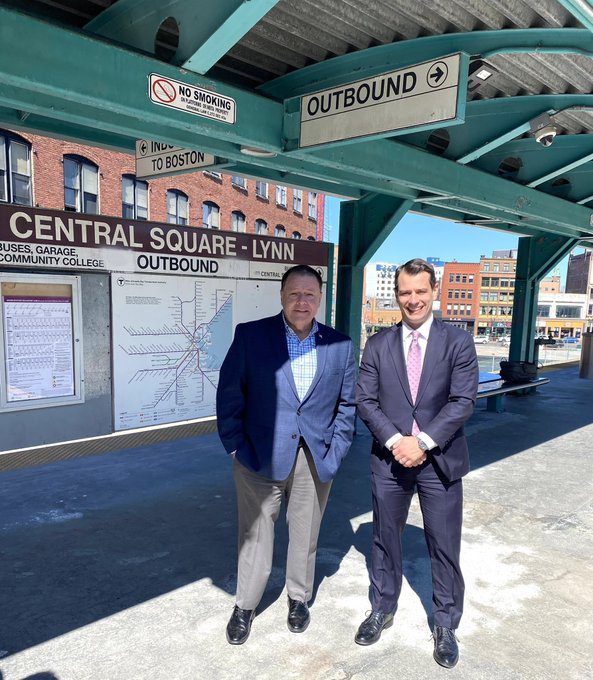LYNN — Jared Nicholson and Thomas P. Koch, mayors of Lynn and Quincy, respectively, met Wednesday afternoon to discuss the city’s goals for public transportation and its relationship with the MBTA Advisory Board.
Koch chairs the MBTA Advisory Board, which is tasked with reviewing and commenting on the Massachusetts Bay Transportation Authority’s annual budget, operations, capital and long-term plans.
Nicholson said the conversation was about advocating for Lynn’s public-transportation improvement goals, such as electrifying the Newburyport/Rockport line— also known as the environmental justice corridor—and establishing a ferry route from Lynn to Boston.
“What we are trying to do is to advocate our plans to the MBTA,” Nicholson said. “We want to ensure that this is part of the agency’s five-year Capital Investment Plan (CIP).”
The MBTA released a draft of this plan Thursday. It budgets $9.4 billion for 552 projects through fiscal year 2027, including $11 million on decommissioning the closed Lynn MBTA parking garage and $14.8 million on improvements to the city’s commuter rail station.
The plan, which will be voted on in May, does not include funding for Lynn’s two transportation priorities: electrification of the Newburyport/Rockport line, which services the city, and reimplementing a Lynn-to-Boston ferry service.
Nicholson said the city submitted video testimony to the MBTA about the benefits of Commuter Rail electrification before the CIP presentation.
“Electrification of the environmental justice corridor not only makes transportation greener, but it opens up a lot of sites to the public,” Nicholson said. “This includes building a station at the General Electric River Works site and stations in Everett and Chelsea.”
On March 21, Nicholson, along with 23 other state, federal and local leaders sent a letter to the MBTA asking it to include electrification of the commuter rail line, along with reduced fares and increased train frequency, in its five-year plan.
“We must continue to invest in public goods that will push communities towards inclusive growth, such as public transportation,” Nicholson wrote. “The electrification of the environmental justice corridor will help tackle long-standing equity issues as well as improve connectivity for Lynn’s residents and increase access to jobs and housing.”
The price tag of the proposal is $815 million, with $400 million being spent on the electrification itself, $260 million for step-free access to speed up boarding to increase accessibility, $120 million for infill stations that will eventually exist on the line, and $35 million for trolley rapid transit that would serve as a link between downtown Peabody and the Salem Commuter Rail Station, Nicholson said.
The project was approved by the MBTA Fiscal Management and Control Board in November 2019, but the members assigned to the board have been replaced since then.
Nicholson said this week’s meeting provided an opportunity to build a relationship with Koch, as the two mayors found common ground about how public transit improvements can help their cities.
“The thing about Quincy is that it has the Red Line, which allowed them to open up a lot of opportunities for the city,” Nicholson said. “Quincy is similar to Lynn as we are both a drive away from Boston, we are close to the water and we share the interest of … more regional transportation.”

